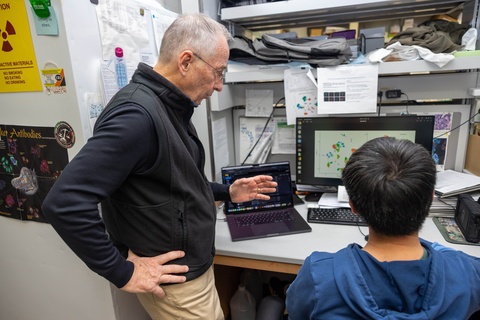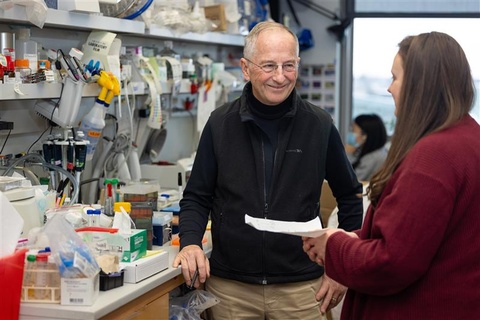Michael Welsh, MD, University of Iowa professor of internal medicine, has received the 2025 Canada Gairdner International Award for his research on cystic fibrosis (CF), which paved the way to new therapies that have transformed the health and life expectancy of people with CF.
The award, which is bestowed annually by the Gairdner Foundation, recognizes five 2025 Canada Gairdner International Award laureates for seminal discoveries or contributions to biomedical science. The award announcement will be made on April 11 via a livestreamed event, and Welsh will formally accept his award at a gala ceremony on Oct. 23 in Toronto, Canada, during Gairdner Science Week, which runs from Oct. 20-24, 2025
Welsh and Paul Negulescu, PhD, senior vice president of Vertex Pharmaceuticals, received the award for “pioneering research into the cellular and molecular mechanisms underlying the genetic disease cystic fibrosis, leading to the development of transformative drug therapies based on these mechanisms, thereby improving and saving countless lives.”
About the Gairdner Foundation
Established in 1957, the Gairdner Foundation is dedicated to fulfilling James A. Gairdner’s vision to recognize major research contributions to the treatment of disease and alleviation of human suffering.
Through the prestigious annual Canada Gairdner Awards, the Foundation celebrates the world’s most creative and accomplished researchers whose work is improving the health and wellbeing of people around the world. Since its inception, 426 awards have been bestowed on laureates from over 40 countries, and of those awardees, 102 have gone on to receive Nobel Prizes.
Mike Welsh’s extraordinary research career is fueled by a deep curiosity for the basic science underlying lung function combined with an abiding commitment to improve the lives of people with CF. He also is a true champion of scientific research as an irreplaceable benefit to society. He is a real exemplar of how collaborative science can lead to discoveries that change lives.
The work of Welsh and Negulescu and their teams spans the full arc of biomedical discovery from fundamental science to effective therapies. Their work changed the course of CF from a fatal disease into a manageable condition for patients receiving treatment.
“Mike Welsh’s extraordinary research career is fueled by a deep curiosity for the basic science underlying lung function combined with an abiding commitment to improve the lives of people with CF. He also is a true champion of scientific research as an irreplaceable benefit to society,” says Denise Jamieson, MD, MPH, vice president for medical affairs and the Tyrone D. Artz Dean of the UI Carver College of Medicine. “He is a real exemplar of how collaborative science can lead to discoveries that change lives.
“We are incredibly fortunate that he has made Iowa his scientific home. His impact on our research community and on CF science has been transformational.”
Born in Iowa, committed to Iowa

Welsh, who was born and raised in Marshalltown, Iowa, has been at the UI for almost his entire career. For more than 40 years, he has developed and led highly productive teams of scientists at the UI and fostered strong collaborations with researchers around the world to investigate the complexities of lung biology and the cellular mechanisms that cause CF. This work paved the way for new therapies that have dramatically improved quality of life and survival for people with CF. His curiosity has also led him to discoveries in neurobiology that may have implications for Parkinson’s disease and Alzheimer’s disease.
Welsh received his undergraduate and medical degrees and did his medical residency at the UI. Following fellowships at the University of California, San Francisco, and the University of Texas Medical School at Houston, he returned to the UI in 1981 to join the faculty in the Department of Internal Medicine. He is the Roy J. Carver Professor of Internal Medicine and Molecular Physiology and Biophysics, and director of the Pappajohn Biomedical Institute at the Carver College of Medicine. He also holds faculty appointments in the neurology and neurosurgery departments at the Carver College of Medicine. He was an investigator with the Howard Hughes Medical Institute from 1989 to 2024.
Throughout his career, Welsh has received numerous honors for his work on CF, including the Steven C. Beering Award (2017), the Warren Alpert Foundation Prize (2018), the George M. Kober Medal (2020), the Shaw Prize in Life Sciences & Medicine (2022), the Wiley prize (2023), and Switzer Prize (2023). He was president of the American Society for Clinical Investigation from 1996-to 1997 and has served as president of the Association of American Physicians. He also is a member of the National Academy of Medicine, the American Academy of Arts and Sciences, and the National Academy of Sciences.
The CF story: From protein to patients
Cystic fibrosis is a genetic disorder affecting 125,000 people worldwide. The disease is caused by mutations in the cystic fibrosis transmembrane conductance regulator (CFTR) gene, which encodes a protein responsible for regulating chloride and bicarbonate transport across cell membranes.
This process is crucial for maintaining the fluidity of mucus and other protective substances in organs like the lungs and pancreas. When the CFTR protein malfunctions, it results in clogged passageways, severe infections, and organ damage.

Beginning in the early 1990s, Welsh and his colleagues revolutionized the understanding of cystic fibrosis by demonstrating that the CFTR protein is a chloride ion channel and is regulated by phosphorylation and ATP (adenosine triphosphate). They also showed how mutations disrupt CFTR function, preventing its proper activity in the cell membrane, and that misfolding and impaired function caused by the common DF508 mutation can be repaired in the laboratory.
This deeper understanding enabled the classification of cystic fibrosis mutations and paved the way for targeted therapies to correct CFTR protein defects.
Negulescu led the research team at Vertex Pharmaceuticals that developed the first-ever protein folding correctors, a novel class of medicines to specifically restore the function of the CFTR protein. One of these, Trikafta, is a triple-combination therapy with the potential to treat approximately 90% of cystic fibrosis patients, including those with the DF508 mutation.
The work of Welsh and Negulescu and their teams have transformed cystic fibrosis from a fatal disease into a manageable condition for patients receiving treatment, showcasing how fundamental science can lead to life-saving innovations. Their efforts span the entire biomedical journey, from basic discovery to therapeutic intervention.
Previously, cystic fibrosis treatments focused only on managing symptoms, with patients facing significantly reduced life expectancy. Today, treatments built on Welsh’s discoveries and innovations by Negulescu’s team at Vertex address the disease's root causes and can provide greater quality of life and life expectancy to those who receive it.
Beyond cystic fibrosis, their achievements have reshaped genetic medicine by proving the viability of mutation-specific treatments and offering a framework for addressing other protein-folding disorders.
“The outstanding research contributions of this year’s laureates represent the power of science to solve the most pressing questions about human biology and improve the health and lives of people around the world. As a proud Canadian organization, we honor the world’s most accomplished researchers whose discoveries are advancing humanity and the world,” said Dr. Janet Rossant, President and Scientific Director of the Gairdner Foundation.
Read more about the 2025 Canada Gairdner Awards.
Editor's Note: This release includes information from the Gairdner Foundation news release

Read More about Mike Welsh
- University of Iowa physician–scientist receives prestigious Lasker Award
- Curiosity and collaboration, leading to excellence
- UI researcher included in elite group to win global biomedical science prize
- Time Capsule: Michael Welsh is a global leader for discoveries on cystic fibrosis
- Welsh wins 2022 Shaw Prize in Life Sciences and Medicine
- Sleuths on the trail of cystic fibrosis
- UI’s Welsh among team of scientists sharing 2018 Warren Alpert Foundation Prize
